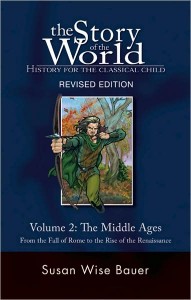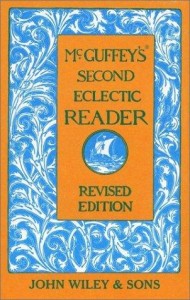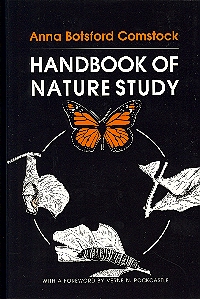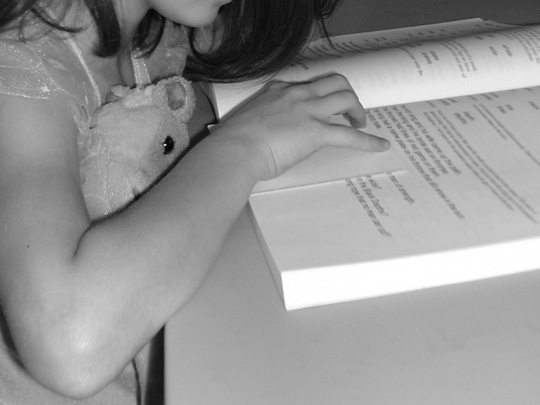Homeschool days

I thought I should record some of the tweaks I’ve made in materials this year, as well as a brief description of how a typical school day goes. I see these on other blogs from time to time, and even if it’s not of interest to anyone else, it will help me to remember what’s working and what’s not.
Fifth grade:
Math: Saxon 6/5. We’ve made our peace with Saxon by implementing a few simplifications to the potentially tedious routine of fact sheet, lesson practice, and mixed practice every day. For instance, identical timed fact sheets tend to be repeated for several days in a row: 100 addition facts, or 64 multiplication facts, etc. Older Daughter keeps doing the same sheet for as many consecutive days as it takes to get it done with no errors in 5 minutes. This keeps a little motivation in the process, and rewards her for knowing the facts by not making her keep doing them once she’s proficient. With the mixed practice, we’ve been doing just every other problem — evens (on even dates) or odds (on odd dates). This reduces the 25-30 problems, which keep drilling concepts from previous lessons, to 15 or so. It’s more manageable and she still gets plenty of review and practice. There is a short section of “lesson practice” problems each day, and I always make her do those; they drill the day’s new concept.
Spelling: Spelling Workout E. This represents a change; I originally planned to use Spelling Wisdom, which theoretically teaches spelling using dictation. I love the concept but felt it wasn’t really working for us — it wasn’t challenging enough. Honestly, Spelling Workout hasn’t created wonderful spellers yet in our homeschool, but it is easy to use and gives more daily practice than Spelling Wisdom.
Writing: Here too, I’ve added materials. I started with Rod and Staff’s “Following the Plan” writing text, and I’m continuing to use it because it’s strong in grammar. But since there is very little actual writing practice, I’ve started using Writing Strands 3 along with it. I’m not sure yet whether it “works,” or what criteria will emerge to determine its effectiveness. But it’s easy to use, addressed to the student and broken into manageable assignments.
Science: Well, we are loving nature study using Comstock’s Handbook of Nature Study, Peterson’s First Guides, and lots of firsthand outdoor observation. I’ve said plenty about that in previous posts.
 History: We are progressing through Story of the World 2, and Older Daughter supplements with readings from the Kingfisher History Encyclopedia and a reading list of my own devising (evil chuckle) that enables her to go more in-depth into the period. This is her second time through this period of history, and she’s able to read independently in a wider selection of books about the various topics we cover. I haven’t given her any decent instruction in outlining a text yet, but she writes summaries of about two history readings a week, as well as two pleasure books, and this furthers her writing skills. She’s pretty good at zeroing in on the main points and “shape” of a text, but right now I’m concentrating on helping her refine her writing by carrying over the paragraphing skills we’re learning in the Rod and Staff text.
History: We are progressing through Story of the World 2, and Older Daughter supplements with readings from the Kingfisher History Encyclopedia and a reading list of my own devising (evil chuckle) that enables her to go more in-depth into the period. This is her second time through this period of history, and she’s able to read independently in a wider selection of books about the various topics we cover. I haven’t given her any decent instruction in outlining a text yet, but she writes summaries of about two history readings a week, as well as two pleasure books, and this furthers her writing skills. She’s pretty good at zeroing in on the main points and “shape” of a text, but right now I’m concentrating on helping her refine her writing by carrying over the paragraphing skills we’re learning in the Rod and Staff text.
Logic: Yes, we’re supposed to be doing logic this year, and I even purchased and received Mind Benders for the purpose. But I cannot for the life of me find the book. I’ve searched high and low, and it is quite lost. (So is Many Moons, a book I actually had to check out of the library to revisit with the girls because our copy is so completely lost.) So logic isn’t happening as yet.
Art, music, gym: These are quite hit-or-miss at the moment, except for horseback riding lessons once a week. Piano lessons are haphazard (I am the teacher). Art is constantly happening, and we do draw together in our nature journals. But the only actual instruction has been from Jan Brett’s online drawing videos. So, guilt, guilt, guilt.
And there was evening, and there was morning, in fifth grade.
Second grade:
Math: Saxon 2. All is going well. My heart is strangely warmed when I see my 7-year-old adding columns of numbers and regrouping. We don’t even have the meeting book, but we do the lesson sheets and fact sheets every day.
Spelling: Spelling Workout B. Charlotte Mason suggests waiting till 3rd grade to start spelling, and I tried to hold off this year. But I felt like this was necessary.
Writing: Younger Daughter dictates narrations for history readings and for two pleasure books a week. She does copywork daily to work on handwriting and “practical spelling.” I’m holding off on cursive until we aren’t reversing any letters and numbers — we’re getting better at this, but we’re not perfect yet. For grammar, we’re continuing with the second-grade half of First Language Lessons for the Well-Trained Mind.
Science: See above.
 Reading: We finished The Ordinary Parent’s Guide to Teaching Reading awhile back and I was having Younger Daughter just read to me daily, but I missed having a systematic spine of some kind. So I broke down and got her a McGuffey’s Reader. I’m not a worshiper of all things old-fashioned just for the sake of being old-fashioned, but we’re really enjoying these daily readings and pictures.
Reading: We finished The Ordinary Parent’s Guide to Teaching Reading awhile back and I was having Younger Daughter just read to me daily, but I missed having a systematic spine of some kind. So I broke down and got her a McGuffey’s Reader. I’m not a worshiper of all things old-fashioned just for the sake of being old-fashioned, but we’re really enjoying these daily readings and pictures.
Art, music, gym: See above, minus the horseback riding (you have to be 8 to start). More guilt.
And there was evening, and there was morning, in second grade.
Typical day for us:
We don’t do a daily “circle time,” though it’s an appealing concept to me. We do start each day with a reading from Egermeier’s Bible Storybook at breakfast, and a short prayer. We’ll finish this storybook this week, and I’ve purchased an Adventure Bible to launch into this reading plan starting next week.
As of this week, we also sing a hymn — this week it’s “Joyful Joyful, We Adore Thee” (first verse only, at this point) and the plan is to learn a hymn a week. I’m looking forward to checking out the library copy of Then Sings My Soul, and I may get our own copy if reading about the stories behind the weekly hymn is something that enriches our devotional time together.
After that, the girls go make their beds and get dressed and brush teeth. They start in on what they can do independently: math fact sheets, a page of spelling, and maybe copywork or a section of Writing Strands.
Three days a week, I go run on the treadmill while they do this, then do a 15-minute Pilates video get stretched back out. I have mixed feelings about this. It doesn’t really fit in with the idealized picture — or at least, one of the idealized pictures — I have of homeschooling, in which I am always in the picture, dispensing wisdom and loving support. But on the other hand is the idealized vision of homeschooling that fosters independent learners. The truth is, there is nothing for me to do as they work through fact sheets and spelling lessons except twiddle my thumbs. I make sure they understand the directions, and if they need help I’m quite accessible as I run from nowhere to nowhere downstairs. Sometimes Younger Daughter does the Pilates with me. But I struggle with feeling selfish for investing this time in myself. I need the time before the girls get up for my spiritual life. That leaves the time after they get up for my bodily life. So, unresolved feelings about all of this.
On days when I don’t exercise, I get cleaned up and ready for the day while they do this morning work. Then I alternate, usually getting Older Daughter going on the new math material for the day, then switching to math with Younger Daughter. (They do the fact sheets on their own, but I work with them on the new lesson material.) Then I switch back to grammar with Older Daughter, then grammar and reading with Younger Daughter. I check their work and make suggestions. If one finishes something and I’m still busy with the other, they can read or take a short break.
We do history together on Mondays, Wednesdays and sometimes Fridays, often listening to the audiobook of our text while having lunch, then discussing the comprehension questions in the activity guide. Younger Daughter dictates her narration; Older Daughter does some reading and writes her narration. We do the map work in the activity guide, and work on our Book of Centuries. (This is just a notebook with a 50-year timeline on each page, organized chronologically. We plot what we’ve studied on the timeline using the chart at the back of SOTW, and paste in the review cards from the activity book at the appropriate dates.)
Then we’re done with the meat and potatoes. Afternoons, we do some reading, and reading aloud, and lots of art and imaginative play or errands. This is when anything that didn’t get completed in the morning — narrations or writing assignments — gets finished up too.
 On nature study days (Tuesday or Thursday) we take a walk, and it usually takes several hours, and doesn’t feel like school at all. We come home and look at the pics we’ve taken and write in our journals and read about something we saw. Some of what we learn gets written down; much of it doesn’t, but if it’s worth knowing it reappears on another day, and gets reinforced that way.
On nature study days (Tuesday or Thursday) we take a walk, and it usually takes several hours, and doesn’t feel like school at all. We come home and look at the pics we’ve taken and write in our journals and read about something we saw. Some of what we learn gets written down; much of it doesn’t, but if it’s worth knowing it reappears on another day, and gets reinforced that way.
The girls really do the work. I give some direction here and there, and keep them on track. But they are great workers, and they’ve caught on to the fact that they have some control over how the day goes, and how long everything takes. I would say they learn equally as much from independent reading and extra-curricular experience as they do from our curriculum plan, and I’m pleased with how they’re doing. If I’m awakened in the middle of the night, it’s usually from anxieties over what they may be missing — more time with other kids, more structured art and music, more challenge in this or that area. Or I wake thinking of my personal deficiencies. But the actual academic part of the whole enterprise, as well as a number of other aspects of it, seem to be working pretty well. I keep checking in with the Lord periodically to see if this is still what we’re supposed to be doing, and so far, of the choices available to us in this time and place, it is.
And there was evening, and there was morning, in our fall 2011 home school.



7 Comments
Amy @ Hope Is the Word
It sounds like you’re having a wonderful and productive year. I think it’s wonderful that you can exercise while your girls get started on their assignments! I wish I could do this, but alas, with our Dear Little Man it just isn’t even a remote possibility. Please don’t feel guilty! I’m glad you mentioned using mcGuffey’s with your second grader. Can you tell me a little bit more about it? Did you just purchase the second grade volume?
Janet
Yes, I just ordered the 2nd grade book. It has short readings and poems in it, all from an earlier era. Each lesson has a list of words with their phonetic symbols before the reading, but I haven’t been doing anything with these.
She reads other books for fun, but just to have a daily meeting where she’s reading aloud to me and I know we’re tracking along where we should be, I like having a graded reader.
Your library might have some copies in the system. You could check them out that way.
bekahcubed
It looks to me like you’re doing a great job.
If my opinion counts for anything, I don’t think you need to beat yourself up at all over how your homeschooling picture doesn’t look like your idealized one. My siblings and I mostly worked independently by third grade or so (at least, we older ones did)–and I felt like the ability to learn from a book (rather than having to hear a lecture) was one of the great advantages of homeschooling. As far as art and gym goes, our study was spotty at best and entirely absent at norm–but those of us who have grown up (to the “grown-up” stage) have still managed to be creative, productive, active members of society.
In other words, I think you’re doing a great job!
Janet
Thank you for the encouragement!
Anne
At the age of sixty-four I have started to exercise. Now this is definitely an appropriate time to feel guilty about waiting too long to spend time on yourself. You owe it to your family to spend time on yourself, because the girls will see you maintaining your physical health. There are just some parts of a sixty-four-year-old body that will never recover from years of neglect. I absolve you of all guilt. Let the good times roll.
By the way, I see that I should not have included my last name. I don’t know how to change it.
Janet
I receive the absolution gladly. But the description of running on the treadmill as “letting the good times roll” — I’ll have to think about that! :-)
I edited your name for you.
Pingback: